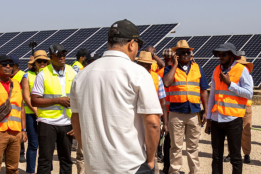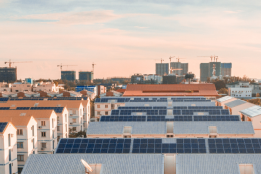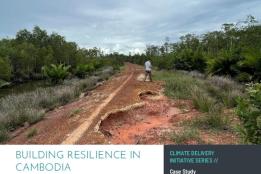Armenia set itself an ambitious target to expand clean power sources in its electricity generation mix to 66 percent by 2036. But a significant barrier to achieving this goal was the prohibitive cost of investment compared to the existing low-cost energy generation. A project funded through CIF’s energy access program, SREP, and the European Bank for Reconstruction and Development (EBRD) helped increase the use of clean power sources among businesses in the country. In the process, it also provided valuable lessons in overcoming affordability issues among small and medium enterprises (SMEs).
The project, called the Caucasus Green Economy Financing Facility (GEFF), launched in 2018 and is the subject of a new CIF study: “Incentives to Promote Local Green Financing to SMEs: Lessons from Armenia”.
The case study examines the implementation of the GEFF financing mechanism, drawing insights from interviews with stakeholders, including financial institutions, policymakers, and end-users. It shows how the project helped align financial institutions and end beneficiaries, as well as how it created opportunities for women to advance in operations and managerial roles.
It also lifts out strategies to navigate implementation hurdles, such as SME concerns over the risk-reward equation in clean power investments and the imbalance of the ratio of men to women in the workplace. Key innovation tools included provision of financial incentives to SMEs and actions to promote more women in management and operations roles in the energy sector.
The project’s results exceeded many if its targets and offered important insights for projects looking to incentivize new energy investments and advance the role of women in green financing:
- Almost 15,000 people benefited from the project including more than 5,600 women (by the end of 2023), well above initial targets,
- Avoided 27,279 tons of CO2 equivalent in annual emissions (much like planting about 450,000 trees and letting them grow for 10 years),
- Generated 62,854 MWh/year from clean power sources
- Provided job opportunities to women and offered training to both financial institutions and female business owners, helping credit providers expand awareness of different borrower needs, and supporting loan applicants to better understand their options and manage businesses more effectively.
The study finds that 15 to 20 percent cash-back provided sufficient incentives for SMEs to get involved, but, looking ahead, a question remains on whether cash-back amounts could be reduced without obstructing the effectiveness of the project. And while the case study captures the significant progress made on representation, it also highlights the need for continued efforts to support women-led SMEs, simplify loan processes, and continue raising awareness of the benefits of green finance.
* This study forms part of CIF’s CDI series that examines the barriers, challenges, and solutions in project implementation and is aimed at project developers, policymakers, financiers, civil society organizations, and private-sector actors.




